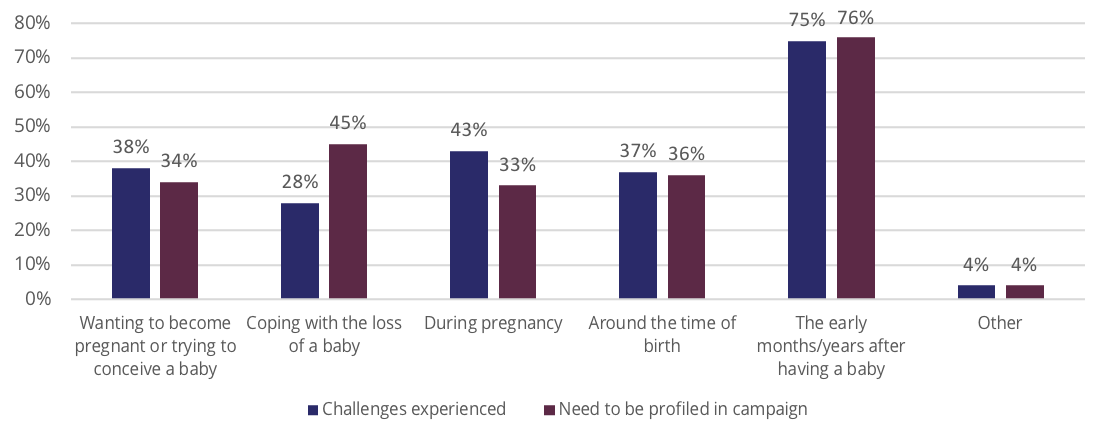Personal experiences of infertility

What the research had to say
COPE research was undertaken with 1,899 consumers and revealed that 38 per cent of individuals identified challenges relating to conception. One of the main challenges related to infertility.

Source: Centre of Perinatal Excellence (2022)
Below are the key themes identified pertaining to personal experiences of infertility. These themes informed the development of The Truth campaign.
Feeling unprepared
In response to discovering that there were problems with fertility, respondents described feeling totally unprepared for what lay ahead. Many expressed shock or surprise at being unable to fall pregnant naturally.
The emotional impact
Respondents also spoke of the emotional rollercoaster of infertility and undergoing infertility treatment.
“(It was) devastating. The constant testing and retesting…riding the monthly roller-coaster hoping for a positive test and being crushed on a regular basis. It was awful. The experience has forever changed me.”
In particular the constant waiting took its toll on emotional and mental health.
“Waiting, waiting, waiting for…results, tests, treatments, appointments. There was always one more thing that we had to wait for and always one more test we dreaded getting the results from.”
Coping with pregnancy loss
In addition to having to sit with the uncertainty about how long it could take, managing the losses with each unsuccessful attempt also had a significant impact on emotional and mental health. This was both in the immediate and longer term.
“The monthly negative tests were heartbreaking, it was like mourning a baby you actually didn’t even have in the first place. The self-doubt of is it me? have I waited too long?” [It’s] stressful like you don’t have control over your own future anymore, you can’t make any plans because you don’t know what the future holds. Loneliness.”
Managing external pressures
Mental health impacts are further exacerbated by pressure from others.
“Fertility treatment comes with ups (hope) and downs (hope lost). Trying to remain realistic but hopeful is hard, particularly when people in your life fall pregnant easily.”
This is often compounded by the pain of watching family, friends or colleagues successfully fall pregnant. Understandably, this lead to feelings of jealousy, resentment and grief.
“The first time before a successful pregnancy there was a lot of resentment towards a family member that didn’t want to get pregnant – but did. Feeling isolated, jealous and on hold. Fear of it never happening”
Experiencing feelings of failure
Respondents also described immense feelings of failure around not being able to conceive. They also described being totally consumed by the desire to conceive, and the pain and frustration as this was not within their control.
“The constant grief and anxiety each month it fails; the obsession and consuming toll it takes.”
This impacted on emotional and mental health both at the time, and extended through to subsequent pregnancies.
Managing impacts on other aspects of life
Many described the impact of infertility on other aspects of their life, including intimate relationships and friendships.
“It strained our relationship, my confidence and our sex life. Our marriage really suffered during this period. I grew restless and frustrated. I didn’t feel able to talk to anyone about it. It was a silent and lonely struggle that my husband and I endured whilst people around us asked when were we going to start a family. It felt like it put my relationship under a microscope and had people pitying us. It was emotionally draining.”
With respect to friendships, these were strained as people felt misunderstood or were the target of unhelpful advice (e.g. “don’t stress, it will happen.”)
“Insensitive comments and advice like ‘go on a holiday’. Genetics is far more complicated than having sex on a holiday.”
The high cost of infertility treatments also put significant strain on finances, adding another strain to hopeful parents.
“(It) really had a huge financial, physical and emotional impact on our lives.”
The cumulative impact of these stressors, even after a successful pregnancy, were perceived to be traumatic and long lasting.
“The hardest part is the cost for all the tests etc. then when it did happen everyone thought you’d be fine then but the trauma of what you’ve been through to hold that baby doesn’t just go away.”
Experiencing loneliness and isolation
People described feeling very alone in their infertility journey. In some instances people described being alienated by their friends as a result of their infertility, compounding feelings of loneliness and failure.
“It’s isolating…also since it’s not a topic often spoken about, you tend to not talk about it like it’s a common conversation starter. Relationships with friends suffered as they conceived but we didn’t, we were shut out to “protect” us but it didn’t feel that way.”
Lacking support and understanding in the workplace
This extended to the workplace, where respondents struggled to receive understanding and flexibility from employers during a vulnerable time.
“Having to live my life as if everything was normal, while behind the scenes I had what felt like a full time job of appointments and tests.”
Lacking support from health professionals
Adding to their distress, respondents also spoke about the inability of services to provide empathy or emotional support during the process.
“Medical professionals were unsympathetic when I said I had mental health problems during IVF. My GP (a woman with children of her own) said ‘well, we can’t all have what we want’ – when I said I really wanted children.’ The psychologist I saw told me to take up quilting as a way to calm my mind. I have never wanted to do quilting in my life, why would she think that it would be a way to help my mental health? I approached those health professionals asking for sympathy and help. They were worse than useless. The staff at the first IVF place we tried were also unsympathetic and unfriendly. Having “blunt” medical professionals discussing my fertility without empathy or compassion.”
Treatment was described as being depersonalised, were they were made to feel “like a number.”
“The commercial aspect of IVF and sometimes a lack of understanding or consideration of the emotional toll made the experience worse.”
Unique challenges – LGBTIQ community
Additional barriers were also experienced amongst same-sex couples requiring IVF. In particular people referred to a lack of confidence and experiencing awkwardness from professionals who had little experience in working with members of the LGBTIQ community. This lead them to feeling more isolated in their experience.
“Lack of local donors and professionals who were unfamiliar and awkward with same sex processes, options and interactions. Because there is a massive gap in awareness, most people – even those who are allies – don’t have the language or knowledge and it can make starting a family hard, scary and isolating for queer parents.”
Read the full research summary
Campaign profile – Melinda
In response to the significant impacts that infertility had on emotional and mental wellbeing, this area was a focus of #thetruth campaign.
Here we focus on the lived experience of Melinda, who bravely shares her personal experience of infertility over many years.